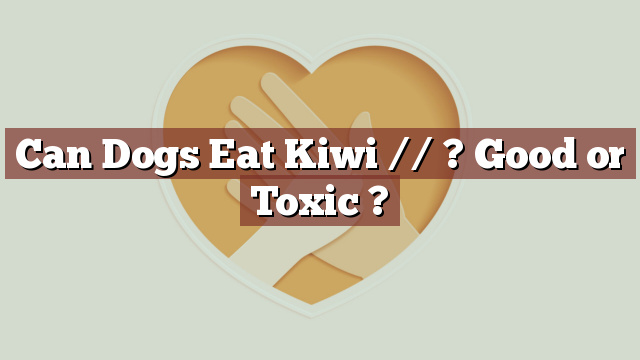Can Dogs Eat Kiwi? Good or Toxic?
Knowing what foods are safe for our pets to consume is crucial for their overall health and well-being. As responsible pet owners, we must be aware of the potential risks and benefits associated with certain foods. One fruit that has gained popularity in recent years due to its nutritional value is kiwi. But can dogs safely eat kiwi? Let’s delve into this question and explore the facts.
Nutritional Value of Kiwi: Vitamins, Minerals, and Fiber
Kiwi, also known as Chinese gooseberry, is a small fruit packed with essential nutrients. It is rich in vitamins C, E, and K, which play a vital role in supporting a dog’s immune system, healthy skin, and blood clotting abilities. Additionally, kiwi contains minerals like potassium, magnesium, and copper, which are important for maintaining proper bodily functions. Moreover, the fruit is a great source of dietary fiber, aiding in digestion and promoting bowel regularity.
Can Dogs Eat Kiwi Safely? Expert Opinions and Research
When it comes to feeding kiwi to dogs, it is important to seek expert opinions and scientific research. According to veterinarians and animal nutritionists, dogs can safely eat kiwi in moderation. However, caution must be exercised, as kiwi can cause gastrointestinal upset in some dogs. The high fiber content of the fruit may lead to diarrhea or an upset stomach, especially if consumed in large quantities.
Potential Risks and Benefits of Feeding Kiwi to Dogs
While kiwi offers several health benefits for dogs, it also carries potential risks. The high sugar content of the fruit can be detrimental to dogs, particularly those with diabetes or weight issues. Additionally, kiwi skins contain small, edible hairs that could cause irritation or allergic reactions in certain dogs. Therefore, it is advisable to peel the kiwi and remove any seeds before feeding it to your canine companion.
On the other hand, the antioxidants present in kiwi can contribute to overall health and help in preventing certain diseases. These antioxidants have anti-inflammatory properties and may aid in reducing the risk of chronic conditions such as cancer and heart disease. However, it is important to note that these benefits can be obtained through other dog-friendly fruits and vegetables as well.
What to Do If Your Dog Eats Kiwi: Signs and Actions to Take
If your dog accidentally consumes kiwi or exhibits any unusual symptoms after ingestion, it is crucial to monitor them closely. Common signs of kiwi-related issues may include vomiting, diarrhea, abdominal pain, or allergic reactions such as itching or swelling. Should any of these symptoms occur, it is recommended to contact your veterinarian immediately for proper guidance and advice.
Conclusion: Moderation is Key for Dogs Consuming Kiwi
In conclusion, dogs can safely consume kiwi in moderation. While this fruit offers various nutritional benefits, it is important to be mindful of potential risks such as gastrointestinal upset, high sugar content, and allergic reactions. As responsible pet owners, it is essential to always prioritize our furry friends’ well-being and consult a veterinarian if you have any concerns or questions regarding their diet. Remember, moderation is the key to a healthy and balanced diet for our beloved canine companions.
Thank you for investing your time in exploring [page_title] on Can-Eat.org. Our goal is to provide readers like you with thorough and reliable information about various dietary topics. Each article, including [page_title], stems from diligent research and a passion for understanding the nuances of our food choices. We believe that knowledge is a vital step towards making informed and healthy decisions. However, while "[page_title]" sheds light on its specific topic, it's crucial to remember that everyone's body reacts differently to foods and dietary changes. What might be beneficial for one person could have different effects on another. Before you consider integrating suggestions or insights from "[page_title]" into your diet, it's always wise to consult with a nutritionist or healthcare professional. Their specialized knowledge ensures that you're making choices best suited to your individual health needs. As you navigate [page_title], be mindful of potential allergies, intolerances, or unique dietary requirements you may have. No singular article can capture the vast diversity of human health, and individualized guidance is invaluable. The content provided in [page_title] serves as a general guide. It is not, by any means, a substitute for personalized medical or nutritional advice. Your health should always be the top priority, and professional guidance is the best path forward. In your journey towards a balanced and nutritious lifestyle, we hope that [page_title] serves as a helpful stepping stone. Remember, informed decisions lead to healthier outcomes. Thank you for trusting Can-Eat.org. Continue exploring, learning, and prioritizing your health. Cheers to a well-informed and healthier future!

